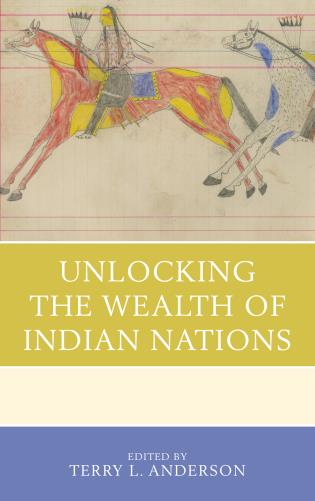Most American Indian reservations are islands of poverty in a sea of wealth, but they do not have to remain that way. To extract themselves from poverty, Native Americans will have to build on their rich cultural history including familiarity with markets and integrate themselves into modern economies by creating institutions that reward productivity and entrepreneurship and that establish tribal governments that are capable of providing a stable rule of law.
The chapters in this volume document the involvement of indigenous people in market economies long before European contact, provide evidence on how the wealth of Indian Nations has been held hostage to bureaucratic red tape, and explains how their wealth can be unlocked through self-determination and sovereignty.
Reviews
The comparative development of the American Indian Nations provides an unrivaled natural experiment with enormous relevance to social scientists. This volume isn’t therefore just a practical agenda to help some of the most marginalized people in the US, it’s also an important intellectual milestone.
— James Robinson
University of ChicagoIn Unlocking the Wealth of Indian Nations, Terry Anderson has assembled an excellent collection of essays confirming the failure of more than a century of top-down, federal paternalism and the promise of bottom-up institutional development by autonomous Indian nations and their citizenry. Through many examples drawn from a wide sampling of native populations, the authors provide convincing proof that, as in the past, property rights and trade are the keys to unlocking the future wealth of Indian nations.
— James Huffman
Lewis & Clark Law School
This edited volume is available from Rowman & Littlefield and Amazon.
From the Prologue
Although the title of this book suggests its focus is on American Indian Nations, the lack of property rights and a stable rule of law applies to indigenous peoples around the world, not just those in North America. The chapter on Māori tribal economies goes beyond North America and should serve as a call for scholars to consider how institutional adaptation allowed indigenous peoples to thrive in the past and how the lack of such adaption prevents them from utilizing their rightful human and physical resources. All of the other chapters provide a template for how indigenous resources can be unlocked to generate wealth for their owners. If this volume is successful for stimulating further scholarship and, more importantly, stimulating a spontaneous evolution of institutional change led by indigenous people themselves, it will have been a success.
Part I. Institutions, Institutional Change, and Economic Growth
- Institutions and the Wealth of Indian Nations by Terry L. Anderson and Bryan Leonard
- Natural Resources on American Indian Reservations: Blessing or Curse? by Terry L. Anderson, Bryan Leonard, Dominic P. Parker, and Shawn Regan
Part II. Indigenous Peoples’ Institutions in Historical Perspective
- Native Americans, Exchange, and the Role of Gift-Giving by Ann M. Carlos and Frank D. Lewis
- The Potlatch as Fractional Reserve Banking by D. Bruce Johnsen
- Māori Tribal Economy: Rethinking the Original Economic Institutions by John Reid and Matthew Rout
Part III. Contemporary Institutional Issues
- Unlocking the Energy Wealth of Indian Nations by Shawn Regan and Terry L. Anderson
- Divided Interests: The Increasing Detrimental Fractionation of Indian Land Ownership by Jacob W. Russ and Thomas Stratmann
- Forced Coexistence and Economic Development: Evidence from Native American Reservations by Christian Dippel
- The Legacy of United States v. Washington: Economic Effects of the Boldt and Rafeedie Decisions by Dominic P. Parker, Randal R. Rucker, and Peter H. Nickerson
- Paternalism versus Sovereignty: The Long Run Economic Effects of the Indian Reorganization Act by Dustin Frye and Dominic P. Parker
Part IV. From the Bottom Up
- Indian Entrepreneurship by Robert J. Miller
- Unlocking First Nation Wealth: Past Efforts and Future Opportunities by André Le Dressay
From the Epilogue
May the ideas in this volume help spark the institutional change necessary to unlock the wealth of Indian Nations and restore dignity for indigenous people around the world.
This edited volume is available from Rowman & Littlefield and Amazon.







